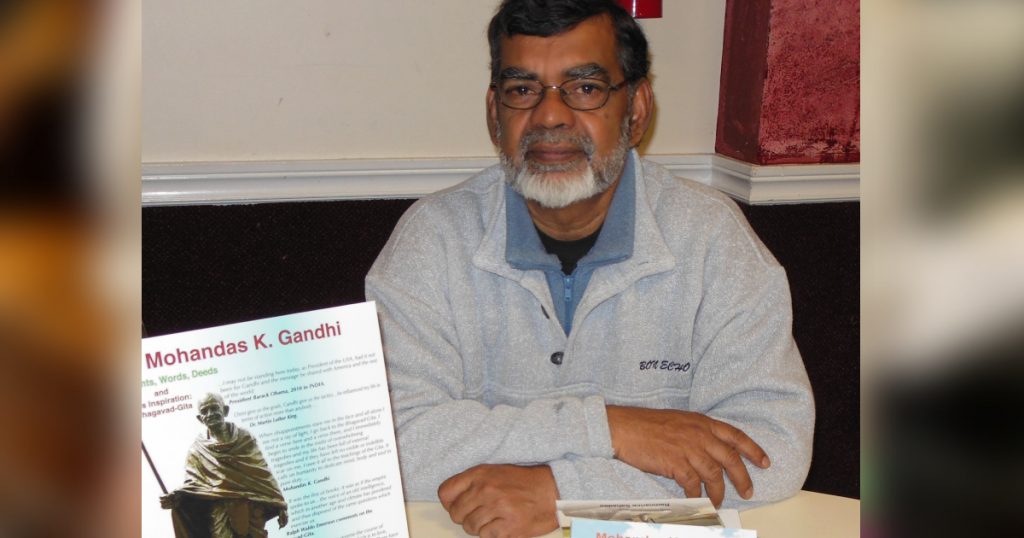On October 2, 152 years ago Mohandas Karamchand Gandhi was born in Porbandar, Gujarat, India. This event is celebrated globally but 2021 may have special relevance because recent events brought to light some of the issues that he confronted and exposed as he confronted the greatest Empire on earth armed only with truth, knowledge, courage, and a walking stick.
Gandhi is much revered globally but many of the countries of the former Empire, including India, are still feeling the after effects of the wounds inflicted from the idea of cultural and religious superiority that the European explorers took with their flags to foreign lands.
One of these is the practice of religious conversion.
The Canadian society is still trying to find ways to heal and has recognised September 30 as a new holiday to pursue TRUTH AND RECONCILIATION. (See LETTERS IN Guyana Times September 30 🙂
The political saint was among many icons that questioned the unnecessary practice of religious conversion and highlighted the methods used and the harmful results to the Hindu family and society. His views were expressed in his publications YOUNG INDIA and HARIJAN as early as 1925. He made it abundantly clear that he was not against the message of Christ. Some of his quotes on the subject are summarised at pages 128 to 131 of the book MOHANDAS K. GANDHI, THOUGHTS, WORDS, and DEEDS.
Swami Vivekananda also addressed religious bigotry at the Parliament of World Religions in Chicago as early as 1893. The late Swami Dayanand Saraswati wrote to the Pope in 2015 reminding him that Conversion was an act of violence and an impediment to world peace.
This subject was discussed at the First World Hindus Congress in 2014 in Delhi. This concern was echoed at The Second CONGRESS in Chicago in 2018 to mark the 125th year of Swami Vivekananda’s first speech in the West on 9/11 1893. This global nefarious practice is not only unethical but the methods used can violate generally accepted legal principles from simple trespassing to terrorism generating fear and intimidation depending on the definition and context.
Hopefully s. 18 of the UN CHARTER OF RIGHTS which limits itself to freedom to convert needs to be amended to denounce illegal or unethical methods of religious conversion in all member states as it remains a barrier to universal brotherhood. Even in the smallest nations it is a source of disunity and disrespect.
GANDHI and JESUS.
Despite his bold opposition to conversion Gandhi was a great admirer of Christ and took Bible studies when he was in England long before he read the Gita. In fact to his embarrassment the message of Krishna was introduced to him by two Englishmen. He was particularly smitten with the message of the Sermon on the Mount and felt that it was a complete guide to one who wanted to live a Christian life. A similar message was reflected in the Gita which in graphic language reduced it to a scientific formula. In all his struggles commencing in a South Africa and up to his death consistent financial and public support flowed from Christians, Jews and Muslims.
GUYANA: A QUIET CRISIS
Guyana the first country in the Western world to which the children of Bharat were sent as indentured labourers on May 5, 1838 is still reeling from the effects of religious hegemony. According to census figures the percentage of Hindus continues to drop significantly. Some speculate that if this current trend continues the culture would disappear as in other Caribbean countries where Indians still live but do not practice the way of life of their ancestors. They echo the same sentiments as Gandhi that the missionaries start as the vendor of scarce goods and services, followed by disparaging remarks about religion, culture, food, and clothing resulting in family division. While the statistics prove there is a crisis by conversion it is compounded by the fact that friends, family or neighbours do not lend adequate support to the victims of unethical conversion in situations where they ought not to be quiet. The few evangelists who actively continue to reap souls are persistent, effective and most likely financed from abroad.
The first step is to let those who proselyte know that their words and deeds are offensive. Generally religious leaders respect other faiths at least when speaking in public.
The situation in Guyana was confirmed by a report of Fred Stella who as a member of Hindu American Foundation National Leadership Council visited on a lecture and listening tour in 2019. (info@HinduAmerican.org)
